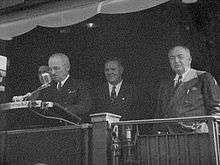Harley Orrin Staggers
| Harley Orrin Staggers | |
|---|---|
 | |
| Member of the U.S. House of Representatives from West Virginia's 2nd district | |
|
In office January 3, 1949 – January 3, 1981 | |
| Preceded by | Melvin C. Snyder |
| Succeeded by | Cleve Benedict |
| Personal details | |
| Born |
August 3, 1907 Keyser, West Virginia |
| Died |
August 20, 1991 (aged 84) Cumberland, Maryland |
| Nationality | American |
| Political party | Democratic |
| Spouse(s) | Mary Casey Staggers |
| Children |
Margaret Anne Staggers Mary Kaye Staggers Frances Susan Tasker Elizabeth Ellen Shank Harley O. Staggers Jr. Daniel Staggers |
| Alma mater | Emory and Henry College |
| Occupation | Teacher |
| Religion | Methodist |
Harley Orrin Staggers Sr. (August 3, 1907 – August 20, 1991) was a Democratic U.S. Representative from West Virginia (2nd District) from 1949 to 1981.
Career
Staggers was born on August 3, 1907 in Keyser, Mineral County, West Virginia, and graduated from Emory and Henry College in 1931 and did graduate work at Duke University.

Staggers served as sheriff of Mineral County from 1937 to 1941. He served as a navigator in the U.S. Naval Air Corps during World War II. In 1948, Staggers was elected to the U.S. House of Representatives, representing West Virginia's 2nd Congressional District. He was reelected to another 15 terms in the congress, serving until his retirement in 1981. For 16 years, from 1966 until his retirement, Staggers chaired the powerful House Committee on Foreign and Interstate Commerce (Energy and Commerce), the longest uninterrupted tenure of any chairman of that committee in its over 200 year history (Staggers' successor, John Dingell, served for 14 years from 1981 until 1995 and again from 2007 until 2009). He was a delegate to the Democratic National Convention from West Virginia in 1960. He died in Cumberland, Maryland on August 20, 1991.
First Amendment
On June 10, 1971, the U.S. Supreme Court ruled that the Nixon Administration could not block The New York Times from publishing the Pentagon Papers. The next month, on July 12, 1971, Staggers ordered CBS News to hand over film not used in the documentary, Selling of the Pentagon.
According to Staggers this was the only way to know if the documentary had been accurately edited. The president of CBS News, Frank Stanton, said he would go to jail before complying with Staggers' subpoenas. The House supported Stanton and Staggers was forced to abandon his ultimatum.
In 1973, Staggers heard on the radio the John Lennon song "Working Class Hero" — which includes the lines "'Til you're so fucking crazy you can't follow their rules" and "But you're still fucking peasants as far as I can see" — on WGTB and lodged a complaint with the Federal Communications Commission (FCC).<ref =name="RadioFree">Raz, Guy (29 January 1999). "Radio Free Georgetown". Washington City Paper. Retrieved 31 March 2009.</ref> The manager of the station, Ken Sleeman, faced a year in prison and a $10,000 fine, but defended his decision to play the song saying, "The People of Washington, DC are sophisticated enough to accept the occasional four-letter word in context, and not become sexually aroused, offended, or upset." The charges were dropped.[1]
Illegal drugs in sports
On May 11, 1973 the House Committee on Interstate and Foreign Commerce which was chaired by Staggers issued a press release[2] summarizing the results of an investigation that determined illegal drug use existed in all level of sports. The investigation also described the degree of use, including steroids and amphetamines, as alarming.
Legacy
Nationally, his name is perhaps best known as for the federal Staggers Act of 1980, which carried out deregulation of the railroads. Elements of the new law allowed carriers to enter into contracts with shippers to set prices and services, without Interstate Commerce Commission (ICC) approval. The Staggers Act is widely credited with freeing the industry from stagnation under an outdated regulatory structure, allowing it more freedom to compete with other modes of freight transportation such as trucking and air transport. Under the provisions of the Staggers Act, the former regulatory model which had contributed extensively to the massive financial failure of the Penn Central Railroad in the 1970s (forcing the creation of Conrail, which in the beginning was also losing money) was largely rendered impotent. With new market freedoms, the Staggers Act led the railroad industry into a period of much greater stability and profitability, and in many cases, defied opponents' predictions of higher shipping costs. Perhaps even to the amazement of supporters of the Staggers Act, Conrail became a profitable company, repaid its massive federal debts, and was soon a highly desired acquisition target by other large railroad companies, with its lines eventually being sold at a premium to a combination of CSX Corporation and Norfolk Southern interests, preserving competition even as this was accomplished.
Representative Staggers was also a strong supporter of the federally created passenger railroad Amtrak, which did not achieve the potential goal of self-sufficiency. However, creation of Amtrak freed the freight railroad industry from a massive burden of passenger service related-losses and helped preserve a national rail passenger system for the United States, providing some alternatives to an aging Interstate Highway System.
The town and surviving family of Staggers honored him by naming the section of Water Street that runs beside New Creek, in front of the middle school and vocational center, and in front of the bridge to his residence, Harley O. Staggers Sr. Drive.
Children
Staggers' daughter, Mary Kaye Staggers, was a professor at Potomac State College and is a member of the West Virginia Democratic Executive Committee. His sons, Harley O. Staggers Jr. and Daniel C. Staggers, practice law in Keyser, West Virginia. Harley Jr. was also a member of the United States House of Representatives, representing West Virginia's 2nd congressional district from 1983 to 1993. Another daughter, Margaret Anne "Peggy" Staggers, a resident of Fayetteville, West Virginia, has been a member of the West Virginia House of Delegates since 2006. Daughter Susan owned and managed two successful local businesses in Keyser until her and her husband's retirement. His daughter Ellen resides in Morgantown.
See also
References
- ↑ Blecha, Peter (2004). Taboo Tunes: A History of Banned Bands & Censored Songs. Backbeat Books. pp. 160–161. ISBN 0-87930-792-7.
- ↑ reform.democrats.house.gov
External links
- United States Congress. "Harley Orrin Staggers (id: S000778)". Biographical Directory of the United States Congress. Retrieved on 2009-05-20
- NNDB Profile
- Harley O. Staggers, Sr. Congressional Papers
| United States House of Representatives | ||
|---|---|---|
| Preceded by Melvin C. Snyder |
Member of the U.S. House of Representatives from West Virginia's 2nd congressional district 1949–1981 |
Succeeded by Cleve Benedict |
| Political offices | ||
| Preceded by Oren Harris Arkansas |
Chairman of the House Interstate and Foreign Commerce Committee 1966–1981 |
Succeeded by John Dingell Michigan |

